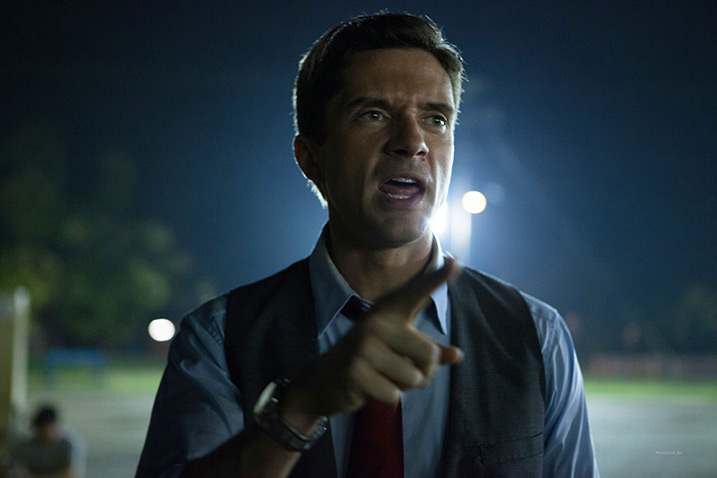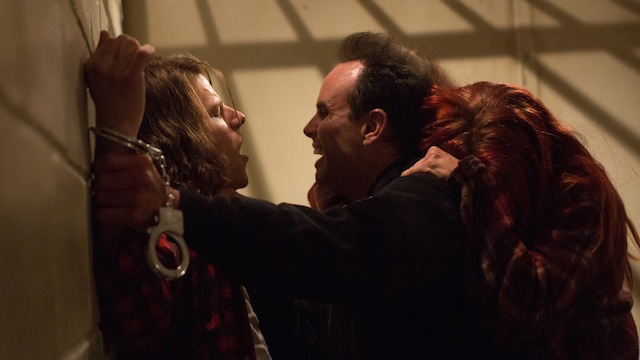The world is too messed up to obsess over bad movies as much as we do; isn’t it time we obsess over good ones? In his monthly column You Have To See This, Chuck Winters reaches into his pile of flawed, forgotten, or just plain fascinating gems to figure out what makes them tick and what makes them matter.

Max Landis gets a lot of shit from nearly everyone that I’m tight with, much if not all of it justified. However, I don’t hate the prolific black-and-blonde-haired screenwriter like many of my peers do, mostly because I don’t think his douchiness is entirely his fault. By no means should he be excused for this reason, but it wouldn’t hurt to remember that you’re talking about the son of a man who defined 80s pop culture almost as thoroughly as Spielberg and Carpenter did. Having a name associated with that level of prestige brings an inevitable bubble of privilege. Sometimes you recognize that bubble, try to educate yourself, and rise above it. Other times, you remain blissfully ignorant and share a thought like “The Force Awakens is a bad movie because Rey is a Mary Sue,” never fully understanding why you’re getting dogpiled for it.
For anyone who doesn’t understand what the hell I’m talking about: “Mary Sue” is a term that originated in fanfiction. It originally satirized fanfics that, instead of building on the lore and ideas suggested by the original property, tell stories about “author insert” characters that are the absolute best at everything and are fawned over by the principal cast for their brilliance. (Wikipedia covers it pretty well if you’d like to know more.) In time, the definition expanded to cover characters in any fiction who are “too perfect” to be considered realistic, and seem to function more as proxies for the author or certain audience members.
Let’s put aside the fact that there are maybe too many people who think “gets shit done” isn’t a realistic trait for a woman to have; my issues with the Mary Sue critique (also known as a Gary Stu critique for male counterparts) are more functional. It’s true that a well-balanced protagonist can be more appealing and interesting to a reader/viewer than someone who is just plain awesome and never gets it wrong. On the other hand, if that were an iron-clad rule, more people would have walked out of Fast Five thinking “That was okay, but I wish Dominic Toretto fucked up more often.”
To be sure, I’m a little more conservative than most of my peers on this subject; I think the Mary Sue/Gary Stu critique has its place. In a phrase that’s become so rooted in sexist rhetoric, however, you have to be consistent in your use of this specific critique, and you absolutely cannot miss the forest for the trees. I wasn’t bothered by Landis calling out The Force Awakens for Mary Sue-ism because I disagreed with him; I do, but that’s not the point. The bigger issue, for me, is that he should know better. His script for American Ultra, directed by Nima Nourizadeh, is a Gary Stu story.
Let’s look at the basic arc: Mike Howell (Jesse Eisenberg) is a stoner living in Liman, a backwater West Virginia town, with his girlfriend Phoebe (Kristen Stewart). Like many stoner archetypes, Mike’s an ambitionless fuck-up, who can’t really bring himself to take Phoebe anywhere outside the town’s limits due to the debilitating panic attacks he gets whenever he tries. Even though this drives Phoebe crazy, she loves him unconditionally, without reservation, and will constantly remind him (and perhaps herself) that his panic attacks are not his fault.
As it turns out, they aren’t. Mike is a deactivated CIA asset who got a whole shitload of Jason Bourne-esque training as part of an experimental program codenamed “Wise Man.” He was the only success story; the other assets lost their minds before they could be of any use. So the program’s director, Lassiter (Connie Britton) voluntarily shuttered it and wiped everyone’s memory, sending them all off to live peaceful, albeit monitored lives in remote parts of the country.
That was five years ago. After watching Mike try to leave town with Phoebe so many times, company weasel Yates (Topher Grace) jumps at the chance to prove the value of his “Tough Guy” program by sending his crew to put Mike down. When Lassiter gets wind of this, she goes down to West Virginia to personally activate Mike with a series of cryptic code words so that he might stand a fighting chance against Yates’ men. Naturally, this leads to cool shit like him reflexively killing bad guys with spoons and stylishly ricocheting bullets off frying pans into his enemies. Still, his gentle nature remains intact. He doesn’t change. Nobody ever challenges him. Nothing is ever his fault.

This isn’t just Gary Stu in the modern sense; this is damn near classic Gary Stu, straight-up stoner wish fulfillment. And you know what? I think it doesn’t matter, because American Ultra is an awesome movie. There are plenty of respectable critics who wouldn’t back me up on such a claim, but I think if you can get past the level of violence that many of those negative reviews call out, you’ll find a clever and endearing action-comedy.
So how does American Ultra pull that off with such an unbalanced main character?
Obviously you have to start with Jesse Eisenberg, who gives Mike Howell his twitchy credibility. Eisenberg has an amazing face for this role, able to effortlessly flip from sweetly neurotic to casually sinister, back again, and in-between with the slightest tilt of the head or shift of the eye. That makes it really easy for these two contrasting sides of Mike to exist at the same time, selling the reality of his character and keeping him interesting. From there you’ve got Kristen Stewart as Mike’s loyal love interest Phoebe; a normally thankless role, made more thankless here by the lack of information we have on why Phoebe fell so hard for Mike in the first place. The most we get is a solipsistic flashback and the occasional throwaway line from other characters, which keeps the plot moving along but forces Stewart and Eisenberg to mine any quiet moment they can for grounding.
Luckily, the actors are already well-acquainted with each other from the work they did together in Adventureland (another underappreciated movie), and are able to demonstrate a strong rapport between these characters through that pre-established foundation. On top of that, Stewart’s really, really good at doing a lot with a little. It’s eventually revealed (through the aforementioned solipsistic flashback) that Phoebe is also CIA; Mike’s handler, to be exact, helping to keep up the fiction of Mike’s cover identity. Knowing that, watch Stewart’s face when Mike first calls Phoebe to tell her that he just killed two guys that “randomly” attacked him. Her shift in posture and tone once she realizes he’s not kidding is barely perceptible, but it’s there, and it’s a small demonstration of how she manages to make the most out of every little story beat.

Frankly, if the leads can sell it, that’s game, set, and match right there. But Landis’ script goes farther, creating a whole cast of characters who are all in their own little movies. Start with the rivalry between Lassiter and Yates, which really amounts to nothing more than a pissing contest. Yeah, it’s a pissing contest between a smug yuppie prick and an older, emphatic handler, but it’s a pissing contest nonetheless; something the movie makes clear in an awesome post-climax scene that brings in Bill Pullman for a glorified cameo. One of the delights of this movie is watching these two move and countermove against each other, with Lassiter focused on survival and protection of her asset and Yates being increasingly aggressive and petty. There’s a great little detail in how, to close Liman’s borders and flush Mike and Lassiter out, Yates engineers a CDC emergency and frames them as animal activists infected with a highly contagious disease. Standard stuff, except Yates goes a step further and has reports suggest that Lassiter got the virus by having sex with a monkey. Why? Fuck Lassiter, that’s why. Topher Grace sells Yates as both a childish, cowardly little shit and an absolute force to be reckoned with, and by expertly mixing her Friday Night Lights baggage with a sort of desperate “cornered fox” capability, Connie Britton provides a perfect counterbalance to him.

Landis still doesn’t stop there, though; he even gives full arcs to Yates’ henchman Laugher (Walton Goggins) and Lassiter’s assistant Petey (Tony Hale). I wouldn’t call these characters “layered,” but they don’t exactly end up where you expect them to. While Laugher occupies the sort of maniacal sub-boss role that Michael Ironside did in Total Recall, his objectives by the end of the movie are much different than his objectives at the start, as he quietly comes to grips with his insanity and makes some interesting connections between himself and Mike. Petey’s development isn’t nearly as heavy, but for a character that appears to be a pretty standard Tony Hale kind of role, he gets some cool dramatic shit to do as he’s pushed into increasingly difficult situations.
On top of all that, Nima Nourizadeh directs the hell out of this movie. The Iranian-born filmmaker’s previous effort was 2010’s Project X, the “found footage” teen party movie that was produced by Todd Phillips. Nourizadeh demonstrated a keen visual knack within this fairly limiting visual conceit, shifting the tone of the party through clever use of color and music. Here, given a more traditional visual framework, Nourizadeh goes all out, blitzing the viewer with colorful, kinetic action scenes while still finding quiet spaces that give his talented cast room to define their characters in fun, interesting ways.
All of this comes together so effectively that it frankly doesn’t matter if Mike Howell is a bit of a Gary Stu as written. Really, the closest Mike comes to growth throughout the story is when Mike, overwhelmed by the events of the story and assuming that Phoebe (who had just been kidnapped by Laugher) never really loved him, trudges back home to get high with Lassiter in tow, surrendering to whatever might be coming for him. Of course, once Lassiter confirms what Mike had previously believed—that Phoebe always had a thing for him—Mike finds his resolve and rides to save the day. Still, this lack of evolution is never really boring. Aside from there being so much more to the movie besides Mike Howell, the character itself is interesting by virtue of the fact that his two defining qualities, “stoner” and “badass,” should contradict each other.
What does that say, then, about the notion of the Gary Stu/Mary Sue as most people think of it today? I think it says that a flawless character, or at least a character with unemphasized failings, isn’t necessarily the mark of a bad one. An entertaining or interesting character is the end goal; how one gets there is up to the writer, director, and actor. Even if it can’t quite reach that goal, not all hope is lost if the surrounding story and supporting characters can pick up the slack (as big a hurdle as it would be to overcome).
Of course, films being subjective as they are, you don’t have to find something interesting just because I say it is, and Max Landis doesn’t have to think Rey is a good character just because everyone else says she is. Landis just can’t say it’s because she’s a Mary Sue; not because Landis wrote his own Mary Sue and that makes him a hypocrite, but because Landis wrote that Mary Sue and it worked.
What it comes down to is this: If great characters were as easy as balancing them, they wouldn’t be as interesting.
If you know of any movies that you think deserve to be covered in You Have To See This, feel free to tweet your suggestions to @DivisionPost!
